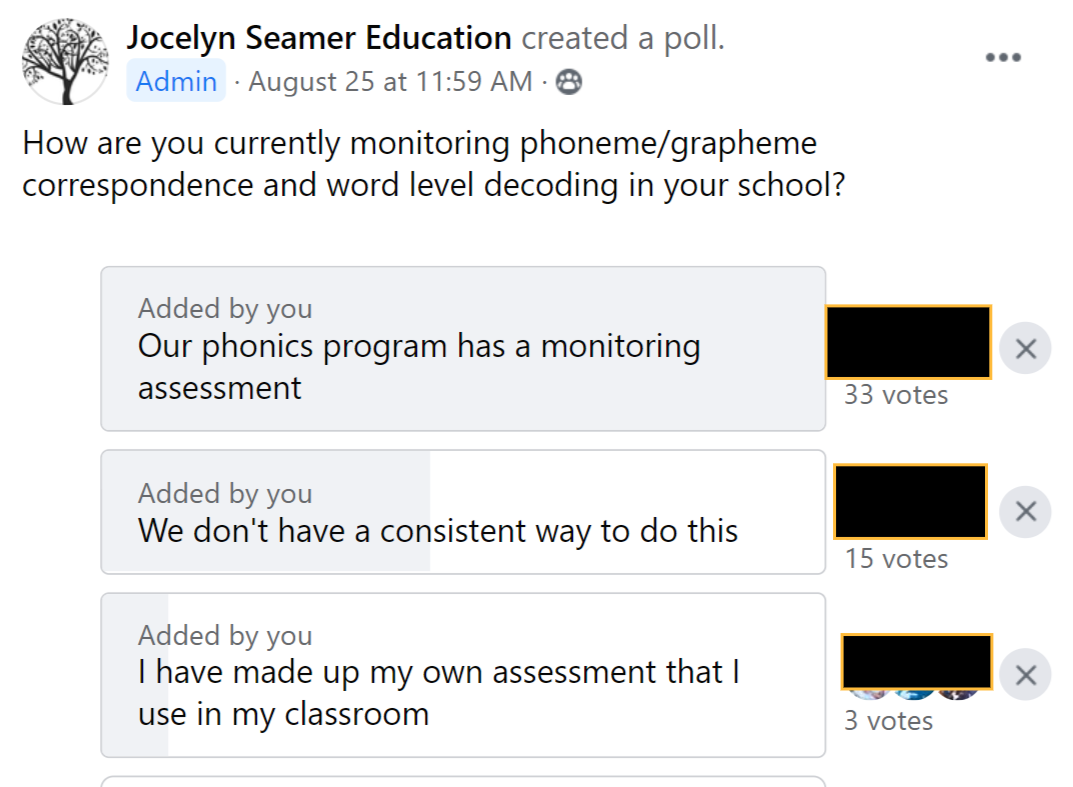Is Your Assessment a Waste of Time?

I love data. I love it so much that the other night I had a dream about going to a school and volunteering to assess every child’s reading. I actually woke up wondering whether I had time…

Data has always been a cornerstone of my practice, both as a teacher and a school leader. I wanted to know where students were up to. I wanted to know what the journey forward looked like. I wanted to know what it would look like when students had learned the things I planned for them to learn. I also wanted assessment and data collection to be something done with students, not done to them and have them understand and value the process.
I recently ran a poll in my Facebook group, ‘On the Science of Reading Bus’ asking about how schools were monitoring students’ phonics knowledge and decoding skill. 40% of respondents said that their school had no consistent way of doing this. 40%! Granted, it was a small sample size, but my guess is that this is quite typical.

The question I asked myself was, “If schools aren’t measuring phoneme/grapheme correspondence and decoding in the early years, what are they measuring?” However, rather than focus on the things that aren’t quite working, today’s post will provide some guidance for ensuring that assessment isn’t a waste of time for either you or your students.
Ask the right questions
In the recent Great Minds Event, ‘The Relationship Between Background Knowledge and Reading Comprehension’, Reid Smith reminded us that we need to know what questions we are trying to answer through assessment. Are we trying to take a snapshot of a whole cohort or are we monitoring the progress of a particular child? If we are trying to monitor progress of the child, what, specifically, do we want to know?
Let’s start with that phonics and decoding data that I asked my Facebook Group about. Here are some questions you might like to make sure you can answer when you analyse your data:
- With what degree of automaticity can the student identify the phoneme that corresponds with the graphemes you are asking them about? Is their response lightening fast or are they spending time “umming” and looking at the ceiling?
- Can the student read real words containing these graphemes?
- How are they decoding? Are they sounding out one phoneme at a time or are they blending in their head and then telling you the whole word?
- Can the student read pseudo words with these graphemes? (This is important because it allows us to assess whether they are actively blending)
- Can the student recall and write the grapheme when you give them the spoken phoneme? (This is important for spelling, so it’s worth investigating. You can do this one whole class to save time)
Another question to ask is, “Is this the right assessment for this child’s development?” I’m going to go out on a limb and suggest that the 40% of schools in my poll who weren’t assessing phoneme/grapheme correspondence consistently, were likely conducting a text level assessment (probably a benchmark assessment) right from the start of the first year of school.
Before assessing a child with a particular tool, ask yourself, “Does this child have the prerequisite skills and knowledge to access this assessment?” Asking a student who doesn’t know the simple code to read a passage or book containing a bunch of words with graphemes they don’t know, is a waste of time. At best, this might tell you how well a student can guess from the pictures. Similarly, sitting a child in front of a computer program with complex passages to test ‘comprehension’ when they can’t read a 5 word sentence with the basic code isn’t going to give you useful data. This is particularly true if the test is multiple choice! There is also the impact on the student’s wellbeing to consider. Personally, I think it ethically questionable to insist that a child ‘attempt’ something that we know 100% that they can’t do. Telling them to ‘just have a go and do your best’ is not helpful at all.
In terms of text level assessment, we also need to be clear about the questions we are trying to answer.

Fluency
- At what rate is the student reading? (are you timing?)
- Are they reading with appropriate expression?
- Are they reading with appropriate prosody (phrasing)?
- Are they attending to punctuation?
- What kinds of words are interrupting fluency? (multi-syllable? Words with particular suffixes? Loan words from other languages?)
- When errors have been made, what is the cause of the errors? (Omitting words, substituting words, reading only the first part of the word and then guessing the rest)

Comprehension
- What level of comprehension are you hoping to measure? (literal, inferential)
- Can the student recall the facts or events in the texts?
- Can the student display inferential understanding?
- Can the student infer at the local level (using pronouns to track meaning, inferring meaning of unfamiliar words, filling in unstated information)?
- Can the student infer at the global level (knowing how part of the text related to the whole, talking about how a character develop through a text)?

Once you have decided on the purpose of your assessment, consider the following:
- Is the assessment you are using going to give you the answers you need?
- How are you ensuring consistency between the people conducting the assessments?
- How often will you conduct the assessment? How often is too often?
- How will the assessment inform your next steps in teaching?
- How will you ensure that students are an active part of the process and understand the purpose of the assessment?
- What kind of data conversation is going to be of benefit to the students?
- Do you need a one-to-one assessment or can you answer your questions through targeted assessment of classroom level work?
The issue of assessment extends far beyond the scope of this blog post, but by being clear about the questions you are trying to answer, you will be in a far better position to have assessment that isn’t a waste of time and actually leads to better results for students.
You can download an informal phonics and word level reading assessment by entering your details below. This is a Word version so that you can adjust it to suit your school's scope and sequence.

 Jocelyn Seamer Education
Jocelyn Seamer Education
1 comment
Thank you for your informative blogs. I enjoy and learn soo much from each of them. Thank you again!
Leave a comment